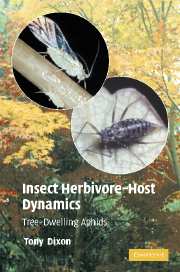Book contents
- Frontmatter
- Contents
- Preface
- 1 Introduction
- 2 Tree-dwelling aphids
- 3 Trees as a habitat: relations of aphids to trees
- 4 Trees as a habitat: relations of aphids to their natural enemies
- 5 Carrying capacity of trees
- 6 Aphid abundance
- 7 Population dynamics
- 8 Risky dispersal
- 9 Seasonal sex allocation
- 10 Aphids and tree fitness
- 11 Rarity, conservation and global warming
- Epilogue
- References
- Species index
- Subject index
Epilogue
Published online by Cambridge University Press: 08 August 2009
- Frontmatter
- Contents
- Preface
- 1 Introduction
- 2 Tree-dwelling aphids
- 3 Trees as a habitat: relations of aphids to trees
- 4 Trees as a habitat: relations of aphids to their natural enemies
- 5 Carrying capacity of trees
- 6 Aphid abundance
- 7 Population dynamics
- 8 Risky dispersal
- 9 Seasonal sex allocation
- 10 Aphids and tree fitness
- 11 Rarity, conservation and global warming
- Epilogue
- References
- Species index
- Subject index
Summary
Studies on insect herbivore–host dynamics have mainly been on leaf-chewing insects and their host plants. This can be justified because many of these insects are relatively large and frequently defoliate, and manifestly adversely affect the fitness of, their host plants. The sap-sucking insects, by contrast, tend to be inconspicuous and apparently less damaging. However, aphids in particular are often very abundant and the most important component of the herbivore fauna of the canopy of trees in boreal and temperate forests, ‘one of the least explored zones on land’. For this reason alone the study of tree-dwelling aphids is justified.
Has this study revealed any broad generalization or principle? It lends strong support to the generation time ratio (GTR) concept, which proposes that the most important life-history trait determining the outcome of the interaction between an insect herbivore and its natural enemies is their relative developmental times. Only those natural enemies that have developmental times similar to a hebivore are likely to regulate its abundance. Surprisingly, even the parasitoids in the systems studied here have appreciably longer developmental times than the aphids. Even for pathogens this concept could apply if the interaction is viewed in terms of the GTR of the pathogen and that of the response time of the immune system of the host. As the GTR concept appears to operate in a wide range of insect predator/prey, parasitoid/host and pathogen/host systems it could qualify as a principle.
- Type
- Chapter
- Information
- Insect Herbivore-Host DynamicsTree-Dwelling Aphids, pp. 174 - 175Publisher: Cambridge University PressPrint publication year: 2005



